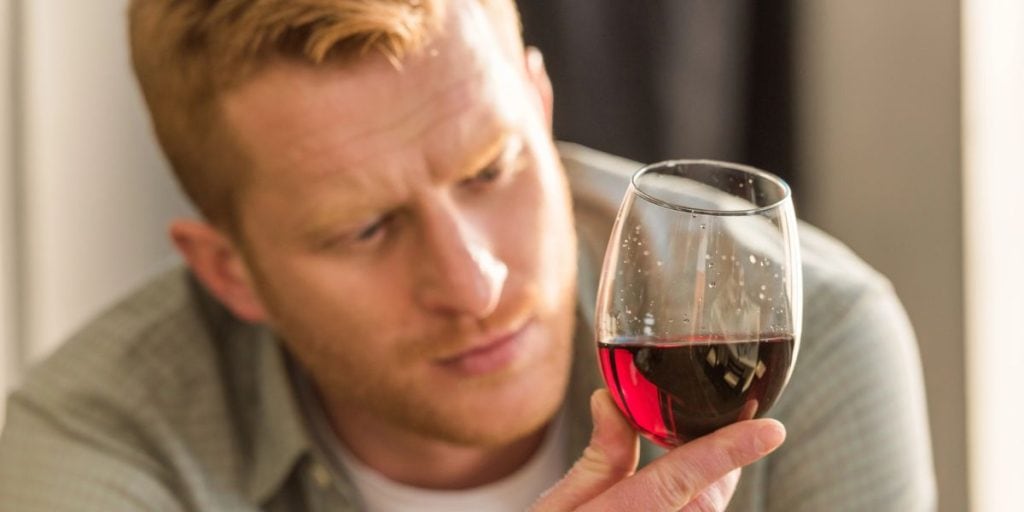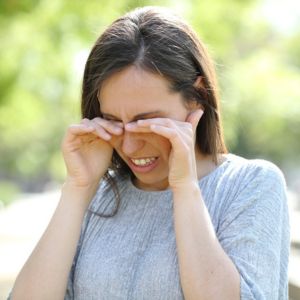Dry eye is a common condition affecting millions globally. It causes discomfort, irritation, and vision issues. While environmental factors and aging are well-known contributors to dry eye, alcohol consumption has also been identified as a factor that can worsen or trigger the condition.
In this article, we’ll explore how alcohol consumption affects dry eyes, the symptoms to watch out for, and ways to protect your eye health if you choose to drink.

What is dry eye disease?
Dry eye is a condition where your eyes don’t produce enough tears, or the tears evaporate too quickly. Tears are essential for maintaining the cornea’s health (the eye’s clear front surface) and vision. When the tear film is disrupted, it can lead to dry eye symptoms such as:
- A gritty or burning sensation
- Redness and irritation
- Blurred vision
- Light sensitivity
- Double vision
- Feeling like there’s something in your eye
There are two main types of dry eye:
- Aqueous deficient dry eye: Caused by a lack of tear production.
- Evaporative dry eye: Caused by quick evaporation of tears, often linked to inflammation of the oil-producing glands.
How does alcohol use affect your eyes?
A 2021 population-based study of more than 77,000 people found that 30% of those who consumed alcohol reported symptomatic dry eye.
Alcohol is known to have various negative effects on the body, including impact on the central nervous system, double vision, blurry vision, bloodshot eyes, dehydration, increased inflammation, and interference with nutrient absorption. Each of these effects plays a role in the development or worsening of dry eye.
Dehydration
Alcohol is a diuretic, meaning it increases the amount of urine your body produces, which can lead to an increased risk of dehydration. When your body loses fluids, it reduces moisture availability for tear production.
Like many bodily fluids, tears require proper hydration to maintain eye comfort and vision clarity. Thus, drinking alcohol can dehydrate the eyes, leading to increased dryness and irritation.
Increased inflammation
Alcohol consumption can lead to systemic inflammation throughout the body. Studies show that inflammation may impact the meibomian glands in the eyelids, which produce the oily layer of the tear film. This oily layer helps prevent tears from evaporating too quickly. Therefore, inflammation of these glands due to light or heavy drinking of alcohol can contribute to or worsen evaporative dry eye.
Nutrient deficiency
Alcohol can interfere with the absorption of certain vitamins and minerals, leading to Omega-3 fatty acids and Vitamin A deficiency. The prevalence of both is crucial for eye health.
Vitamin A is necessary for the production of tears, while Omega-3s have anti-inflammatory properties that support the function of the tear film. The risk of developing or worsening dry eye increases when the body lacks these nutrients.
Alcohol and the tear film
The tear film has three essential layers:
- Mucin Layer: Helps tears stick to the eye’s surface.
- Aqueous Layer: Provides moisture to the eye.
- Lipid (Oily) Layer: Prevents evaporation of tears.
Alcohol consumption can disrupt all three layers of the tear film. Dehydration and inflammation reduce the aqueous and lipid layers, while nutrient deficiencies affect the mucin layer. When any of these layers are compromised, the tear film becomes unstable, resulting in dry eye symptoms.
Symptoms of alcohol-induced dry eye
If you consume alcohol and notice any of the following symptoms, it may be a sign that alcohol is impacting your eye health:
- Increased redness or swelling in the eyes, especially the day after drinking
- Persistent dryness or itchiness in the eyes
- Blurred vision that worsens with alcohol consumption
- Sensitivity to light or glare
- Discomfort with contact lenses if you wear them
Can certain types of alcohol worsen dry eye?

Research suggests that all types of alcohol can lead to negative short and long-term effects such as dehydration and inflammation. But some types of excessive alcohol consumption may be more likely to worsen dry eye symptoms than others. For example:
Beer and wine
These contain sulfites, preservatives that can exacerbate dryness and irritation for some individuals. Red wine, in particular, is known to trigger histamine responses that can increase redness and inflammation.
Liquor and spirits
Higher concentrations of alcohol in spirits like vodka and whiskey can lead to faster dehydration, potentially intensifying dry eye symptoms.
While all alcohol can contribute to dry eye, the effects vary depending on the type, quantity, and individual sensitivity.
Tips to protect your eyes if you drink alcohol
If you choose to consume alcohol but are concerned about dry eye, there are ways to protect your eye health:
Stay hydrated
Drinking plenty of water before, during, and after alcohol consumption can help counteract the dehydrating effects of alcohol. Aim to drink one glass of water for every alcoholic beverage to maintain proper hydration.
Consume moderately
Limiting alcohol intake can reduce the risk of experiencing dry eye symptoms. The Centers for Disease Control and Prevention (CDC) recommends that men limit alcohol consumption to two drinks per day and women to one drink per day.
Use artificial tears
Artificial tears or lubricating eye drops, available over the counter, can help replenish eye moisture and temporarily relieve dryness and irritation caused by alcohol.
Increase Omega-3 intake
Omega-3 fatty acids, found in foods like salmon, flaxseed, and walnuts, have anti-inflammatory properties that can support eye health. Some studies suggest that Omega-3 supplements may improve symptoms in people with dry eye.
Avoid smoking
Smoking can further exacerbate dry eye by increasing inflammation and reducing tear production. If you drink alcohol, avoiding smoking can help reduce the overall impact on your eyes.
Limit certain alcohol types
If you notice that certain types of alcohol, such as wine or beer, worsen your symptoms, consider opting for other types or cutting back altogether. Experimenting with different types can help you find what works best for your body.
Who is most at risk for dry eye symptoms?
While anyone who consumes alcohol may experience dry eye symptoms, certain groups may be more susceptible to these alcohol-related effects:
- Individuals with pre-existing dry eye: Those who already have dry eye are likely to experience a worsening of symptoms with alcohol consumption.
- Older adults: Tear production naturally declines as we age, and alcohol may speed up this process.
- Contact lens wearers: Alcohol can make contact lenses uncomfortable by reducing tear production, leading to dryness and irritation.
- Women: Women, especially those undergoing hormonal changes, are more prone to dry eye and may be more affected by alcohol’s dehydrating effects.
Can dry eye be reversed?
The good news is that alcohol-induced dry eye symptoms are generally reversible with lifestyle changes and good eye care practices. Reducing alcohol intake, staying hydrated, and using eye lubricants can significantly alleviate symptoms for most people. If dry eye persists, it’s important to consult an eye care professional to determine the best course of treatment.
Alcohol and dry eye – a manageable connection
While moderate alcohol consumption may not severely impact everyone, understanding the connection between alcohol and dry eye is essential for protecting your vision and overall eye health. Alcohol-related dehydration, inflammation, and nutrient deficiencies can disrupt the tear film, leading to dry eye symptoms.
By recognizing these effects and taking preventive measures, such as staying hydrated and moderating alcohol intake, you can enjoy a drink without compromising your eye health.
Schedule your consultation today with the internationally recognized doctors at AGEI
Or call
866-945-2745
Assil Gaur Eye Institute is the best ophthalmology practice in California for treating and monitoring dry eye syndrome
Sometimes, despite lifestyle modifications, people may notice that their eyes become drier over time, and techniques used to provide relief from the symptoms of dry eye are no longer effective. That’s why it’s essential to have regular follow-up appointments with our dry eye specialists to monitor any changes in your symptoms and explore new treatment options that can address your situation.
There may be no single treatment to address your dry eye condition completely. Our dry eye care ophthalmologists and optometrists will work with you to find the underlying cause of your dry eye and provide the correct combination of therapies that best suit your symptoms. Our advanced therapies for dry eye include ASEDs (autologous serum eye drops for dry eye), Oculocin Propo, and DELIT and DELIT Plus, to name a few.
Assil Gaur Eye Institute has assembled a team of top ophthalmologists from around the country who offer their patients the highest quality of specialist eye care in the United States.
In keeping with the founding principles of AGEI, eye surgeons keep their clinics comfortable and familiar, much like how family-run medical practices used to be.
In addition to dry eye care, the ophthalmology experts at AGEI are nationally recognized for their eye care and treatment options for a full range of conditions, including eye conditions such as cataract eye surgery, glaucoma, retinal detachment, age-related macular degeneration (and other diseases of the retina), corneal conditions, optic neuropathy, floaters and flashes, dry eye, presbyopia, astigmatism (using a toric lens), farsightedness, myopia, nearsightedness, and other vision correction procedures (refractive surgery) such as LASIK surgery, PRK, refractive lens exchange and many more laser vision correction procedures.
Today, AGEI is nationally recognized for its compassionate, patient-centric health care, commitment to pioneering advances in ophthalmology, and dedication to supporting its patients’ and the community’s health and well-being. Please call (866) 945-2745 or make an appointment online.
We are conveniently located for patients throughout Southern California and the Los Angeles area in or near Beverly Hills, Santa Monica, West Los Angeles, West Hollywood, Culver City, Hollywood, Venice, Marina del Rey, Malibu, Manhattan Beach, and Downtown Los Angeles.
Alcohol and Dry Eye FAQs
Does alcohol always cause dry eye disease?
Not always, but it can contribute to or worsen the condition in individuals prone to dry eye.
Can dry eye be permanently cured?
While dry eye can often be managed, some people may experience chronic symptoms. Lifestyle changes and our medical treatments can provide relief.
How quickly does alcohol affect dry eye symptoms?
Symptoms can occur as soon as the body begins to dehydrate. Effects are often noticeable within hours and can linger into the next day.rnrnBy understanding and managing the connection between alcohol and dry eye, you can make informed choices that support long-term eye health.
Sources
What Are the Types of Dry Eye?
https://www.healthline.com/health/types-of-dry-eye
Alcohol consumption and dry eye syndrome: a Meta-analysis
https://www.ncbi.nlm.nih.gov/pmc/articles/PMC5075667/
Alcohol and the Eye
https://www.ncbi.nlm.nih.gov/pmc/articles/PMC8126742/
The relationship between alcohol consumption and dry eye
https://pubmed.ncbi.nlm.nih.gov/34029755/
The relationship between alcohol consumption and dry eye
https://www.sciencedirect.com/science/article/pii/S1542012421000446













